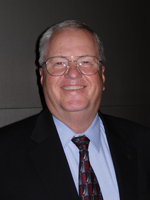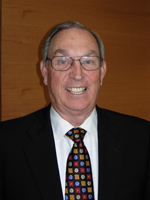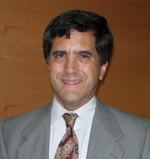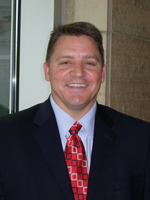 |
Carl Lorenzen |
 |
Joel Johnson, M.D. |
 |
Keith Mueller, M.D. |
 |
Tim Gay |
His daughter was diagnosed with leukemia at age 14, his parents received end-of-life care when they were dying and he’s seen friends with small businesses struggle to pay for health insurance for their employees.
When his daughter, now 32, was pursuing a nursing degree at UNMC, she no longer qualified as a dependent under his insurance policy. So he purchased COBRA insurance and paid nearly $500 a month in premiums.
“She has no more chance of getting cancer again than you or I, but because of her ‘pre-existing condition,’ we had to pay higher premiums,” Lorenzen said.
Lorenzen — who is a candidate to represent District 18 (Blair) in the Nebraska Legislature — was one of about 120 people who attended the Nebraska Health Summit on Thursday at UNMC. He was invited by Nebraska State Sen. Joel Johnson, M.D.
Lorenzen — a retired airline pilot and former brigadier general of the Nebraska Air National Guard — said he learned a great deal at the summit about the state of health care in Nebraska.
“This is a great summit. I want to get my arms around the issues,” Lorenzen said. “One of my concerns is affordability of health care for Nebraskans. The questions are, ‘how do we make health care affordable for everyone on a limited budget and reduction in tax revenues?’ and, ‘how do we get the most value out of health care dollars?'”
The summit was hosted by the UNMC College of Public Health and brought together leaders in the public and private sectors, including health care, state government, labor and civic organizations.
Quality and affordable health care for all Nebraskans was the focus of the daylong summit in the Durham Research Center. The summit gave participants insight into the status of health care in Nebraska, as well as a forum to generate changes in health care delivery, finance and outcomes in Nebraska.
A presentation by representatives of the Nebraska Medical Association (NMA), Richard O’Brien, M.D., of Creighton University Medical Center, and UNMC’s John Benson Jr., M.D., focused on the state of health care in Nebraska. They are co-chairs of the NMA’s Health Care Reform Task Force. The NMA recommends a comprehensive transformation of the health system in Nebraska.
Like other states, Dr. O’Brien said, Nebraska’s health care costs are high and rapidly rising and quality and access to health care services are major issues.
In 2006, 10 percent of Nebraskans were uninsured. Even those with insurance find it difficult to afford. Employee-paid premiums for a family averaged $11,575.
Health care costs of premiums have increased more than three times as fast as household earnings in Nebraska, Dr. O’Brien said. From 2001 to 2007, employees’ premiums increased 16.9 percent.
“Costs are going crazy,” Dr. O’Brien said. “But employers are shifting costs to employees.”
Heath care cost drivers include inefficiency, poor communication and coordination, repeated tests, use of emergency rooms for primary care, high administrative costs and system complexity, Dr. O’Brien said.
Dr. Johnson, who conceived the idea for the summit, sees a broken health care system that needs to be fixed.
“Around the nation it’s been increasingly apparent … that in 10 years we would be in a place where health care will become unaffordable in our country,” he said.
The summit addressed the changes that need to be made, Dr. Johnson said.
“We’re pleased with how the summit went,” he said. “The participants played a very important part. There was a lot of interaction.”
Keith Mueller, Ph.D., associate dean of the UNMC College of Public Health, who along with his team organized and hosted the summit at the request of Dr. Johnson, said he was very pleased with the summit, particularly with the caliber of session discussions.
“The speakers did a really good job and were impressed with the quality of questions and dialogue,” he said. “There were a lot of good, substantive talks. A summit like this is to get people thinking and talking to others. We may have built some momentum.”
Nebraska State Sen. Tim Gay of Papillion said as vice chairman of the Nebraska Legislature’s Health and Human Services Committee, it’s important to get people talking about the health care crisis.
“We’ve identified the problems in health care repeatedly,” Gay said. “I want to hear some positive solutions. I came here to learn and meet leaders in the health care profession. I’m looking to put some of the best ideas together to address concerns.”
The College of Public Health will continue the dialogue with a grand rounds series in the fall.
Sponsors of the summit were UNMC, the Nebraska Medical Association, Nebraska Hospital Association, Alegent Health, and Blue Cross and Blue Shield of Nebraska.
What others said about the summit
“The camaraderie, cooperation and collaboration here — I’ve never seen it as pronounced as today. It’s been a long time coming and it’s time we get started. I’m pleased.” — Laura Redoutey, president of the Nebraska Hospital Association
“It’s another great opportunity to learn. I’ve been on the hospital board for 37 years in David City and have been involved in a wide range of other activities. I don’t think it’s possible to be an effective hospital board member if I don’t take the opportunity to find out what’s going on in the world around you. It’s a great program they have going on here.” — John Klosterman, David City farmer/rancher
“I’m excited by the mix of players we have here at the summit — educators, providers, payers. … We really have to start singing from the same page. We need to be more transparent on what the costs are. We have to start talking to each other. I’m very proud of our approach in Nebraska.” — Nebraska State Sen. Lowen Kruse
“I think it’s important to get a good, comprehensive view on health care in Nebraska and get ideas on how we can go forward on issues of access and affordability. Health care cost is one of the top priorities. Our citizens are looking for relief as they see their premiums go up to the point where many aren’t able to afford health insurance.” — Jeremy Nordquist, aide to Nebraska State Sen. John Synowiecki
“(Reforming health care) is an extraordinarily important topic. The time for action is now. We no longer have the luxury of waiting. Everyone in Nebraska ought to have health care.” — Peter Whitted, M.D., Omaha physician